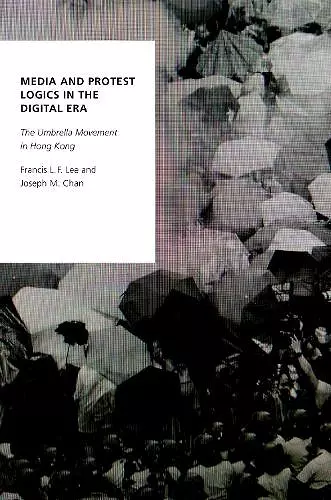Media and Protest Logics in the Digital Era
The Umbrella Movement in Hong Kong
Joseph M Chan author Francis LF Lee author
Format:Hardback
Publisher:Oxford University Press Inc
Published:26th Apr '18
Currently unavailable, and unfortunately no date known when it will be back
This hardback is available in another edition too:
- Paperback£35.49(9780190856786)

Digital and social media are increasingly integrated into the dynamics of protest movements around the world. They strengthen the mobilization power of movements, extend movement networks, facilitate new modes of protest participation, and give rise to new protest formations. Meanwhile, conventional media remains an important arena where protesters and their targets contest for public support. This book examines the role of the media -- understood as an integrated system comprised of both conventional media institutions and digital media platforms -- in the formation and dynamics of the Umbrella Movement in Hong Kong. For 79 days in 2014, Hong Kong became the focus of international attention due to a public demonstration for genuine democracy that would become known as the Umbrella Movement. During this time, twenty percent of the local population would join the demonstration, the most large-scale and sustained act of civil disobedience in Hong Kong's history -- and the largest public protest campaign in China since the 1989 student movement in Beijing. On the surface, this movement was not unlike other large-scale protest movements that have occurred around the world in recent years. However, it was distinct in how bottom-up processes evolved into a centrally organized, programmatic movement with concrete policy demands. In this book, Francis L. F. Lee and Joseph M. Chan connect the case of the Umbrella Movement to recent theorizations of new social movement formations. Here, Lee and Chan analyze how traditional mass media institutions and digital media combined with on-the-ground networks in such a way as to propel citizen participation and the evolution of the movement as a whole. As such, they argue that the Umbrella Movement is important in the way it sheds light on the rise of digital-media-enabled social movements, the relationship between digital media platforms and legacy media institutions, the power and limitations of such occupation protests and new "action logics," and the continual significance of old protest logics of resource mobilization and collective action frames. Through a combination of protester surveys, population surveys, analyses of news contents and social media activities, this book reconstructs a rich and nuanced account of the Umbrella Movement, providing insight into numerous issues about the media-movement nexus in the digital era.
[T]his book offers an important reflection on the role of conventional media (e.g. traditional television and newspaper platforms) and the limits of digital media in movement mobilization. Given an emerging discourse on how conventional media will be replaced by digital media, this book shows that conventional media was still crucial to the mobilization and organization of a social movement. ... The greatest strength of this book is that it situated the [Umbrella Movement] in a larger political and social context, thus enabling the authors to clarify the multiple factors and stages that contributed to the emergence of the UM. Without these historical and contingent elements, the role of conventional and digital media cannot be fully evaluated. This book is therefore an excellent example of contextually sensitive research on social movements that would not exaggerate the immediate effects of the media in movement mobilization. * Kwok Chi, Hong Kong Studies *
ISBN: 9780190856779
Dimensions: 163mm x 239mm x 23mm
Weight: 624g
288 pages